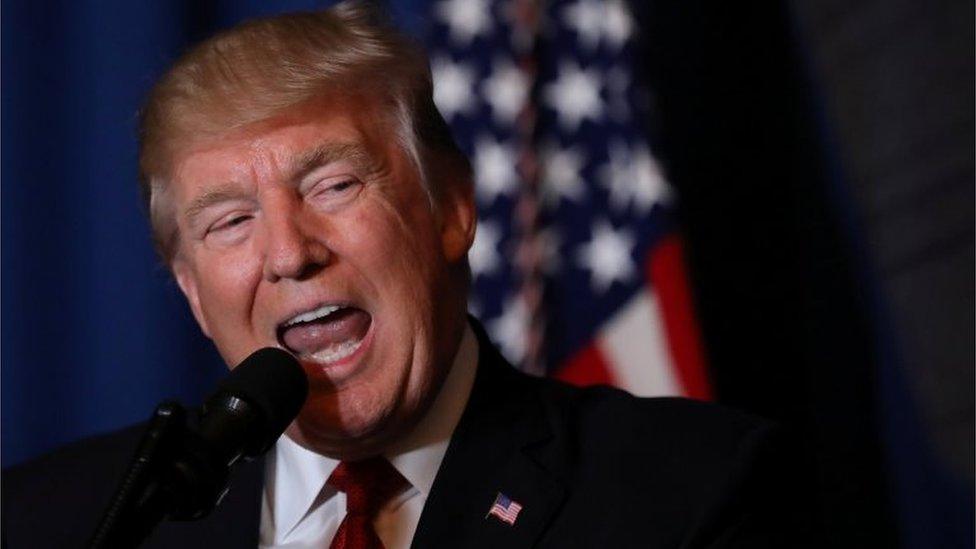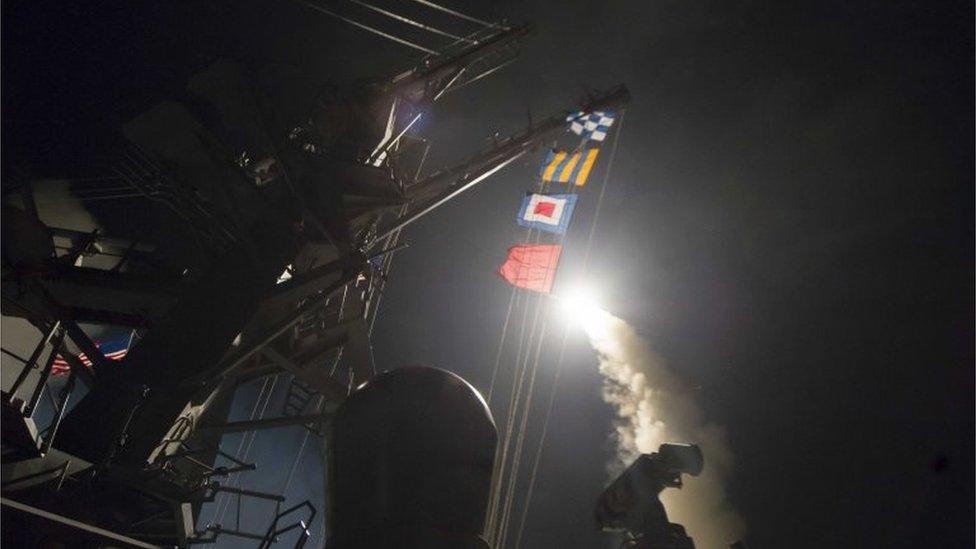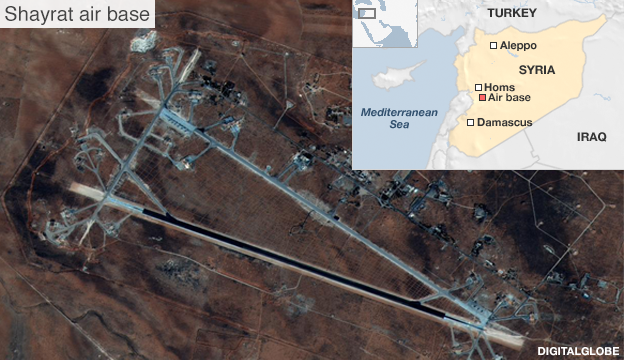Syria war: US strikes a resolute signal from Trump
- Published

Donald Trump said the chemical attack had changed his mind about President Assad
Both the scope and the method of the US attack on Syria's Shayrat airbase suggest that this was a punitive and limited strike intended to deter the Syrian government from using chemical weapons in the future.
The Pentagon says that the airbase that was hit - a little south-east of the city of Homs - was the location from where the aircraft that carried out this week's alleged chemical attack took off.
It says that chemical weapons are stored at the facility. The use of Tomahawk cruise missiles - a kind of arms-length strike - would have enabled an attack with great accuracy.
US warplanes and their crews did not have to encounter Russian air defences. And the number of missiles used - 59 - suggests a strike that was intended to do real damage.
The Russians, the Americans say, were informed about the strike in advance; an attempt to limit any repercussions. The target list, according to the Pentagon, external, rested heavily on aircraft and infrastructure. The aim was not to kill Syrian personnel but to deliver a message.
The 'anti-Obama'
This was a one-off attack to enforce deterrence against the use of chemical weapons, rather than a game-changer intended to destabilise and take-down the Assad government. So the first question is: will it succeed ?
Well, a message has clearly been delivered. There will be those who insist - like the Russians - on asserting that Syria has not used chemical weapons and was not responsible for this week's attack.
The Americans and much of the international community begs to differ. Sarin has been used before, in Syria in 2013. It crossed a "red line" drawn by President Barack Obama - but nothing happened.

Dozens of missiles were fired from US warships in the Mediterranean
So this was a message to both Damascus and Moscow that there is a new man in the White House; Mr Trump is, if you like, the "anti-Obama" and they should take note.
Nerve agent - specifically Sarin - which was again used this week is a horrible weapon. President Trump in his own comments after the US strike, spoke movingly about the deaths of children in the chemical attack.
But of course children have been maimed and killed virtually every day in Syria for several years. And other chemical weapons have been used: chlorine gas by the government and mustard agent by so-called Islamic State (IS).
Is President Trump's new "red-line" going to be enforced against these attacks if repeated ?
Measured strike
There are those who have argued that it is the Trump administration's whole approach to the Syria conflict and its single-minded focus on defeating IS that may have emboldened President Assad to mount this chemical attack (though Syria has denied carrying it out).
If so, then President Assad's gamble seems to have failed, drawing a very different response than perhaps Damascus expected.
If this was a test for the Trump administration, then he seems to have risen to the challenge, using military power in a precise and proportional manner to reinforce the civilised world's long-standing antipathy to chemical weapons.

The nature of the strike bears all the hallmarks of the small group of thoughtful military men around the president, notably the Defence Secretary James Mattis and the National Security Adviser Lt Gen HR McMaster.
It is equally clear what this US strike was not. There is no suggestion that the US is seeking to remove President Assad by military means. Russia and Iran's support for President Assad means that he remains a fixture in Syria just as long as his allies want him there.
His position today is much stronger than it was in 2013, when President Obama failed to act on the use of chemical weapons - at which point the Syrian government might have crumbled.
Heightened risk
But that is not where we are now. What happens next is unclear.
The Russians say that none of their personnel were killed in the attack. But they have suspended an agreement with the Americans under which a military hotline was used to ensure that their two forces did not come into conflict in the skies over Syria.
That has been used on several occasions and its absence will increase the risks for both countries' aircraft.
A tough initial Russian response is to be expected.
In the longer term, both Washington and Moscow now have more of a sense of where they stand.
This is not perhaps the Donald Trump that Moscow expected. But Mr Putin himself is a man who respects action. Maybe in due course Russia and America can find a diplomatic way forward over Syria.
But for now the Syrian government and the Russians both know that Mr Trump - for all his inexperience and bluster - can react in a resolute fashion at a moment of crisis.